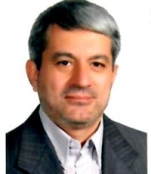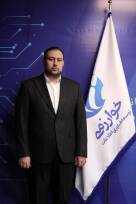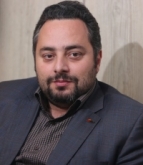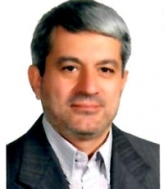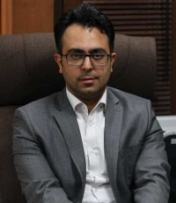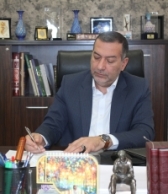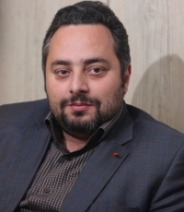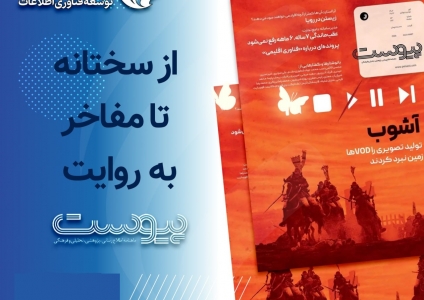
Kharazmi Information Technology Development Company is a mission company of Saderat Bank, which was established in 1376 with the aim of producing, supplying, supporting and exploiting hardware, software and electronic equipment needed in financial banking institutions. Kharazmi Hardware Developers Company, Kharazmi Gostaran Network Company and Ghazal Damon Technology Solutions Company are among Khwarazmi's subsidiary companies, each of which is engaged in the fields of hardware production, network support and equipment supply alongside Kharazmi.
Although Kharazmi was initially a mission and order company from Saderat Bank, but in recent years and with the development of Iran's ICT market, the scope of Kharazmi's activities has also expanded and the missions and goals of this group have changed over the years.

Ali Chaharlangi is now the CEO of Kharazmi Information Technology Development Company. He has joined Kharazmi for about a year, and although not much time has passed since then, he has been able to perform well in the stock exchange and financial process of this group: "I have not been with this group since the beginning of Khwarazmi's activity, and naturally I cannot define all the primary goals. The establishment of this dominant company, but what seems obvious is that the initial goals of Khorezmi have changed during the consecutive years of his activity. In fact, Khorazmi has been formed to supply the hardware equipment of Saderat Bank, and the equipment and maintenance of Saderat Bank products is our first mission. But basically, with all the changes, we are still focused on the same area of sales, equipment supply, support and maintenance, which was the main intention of forming the company, and there has not been much change in this matter."
During its 25 years of operation, Kharazmi has become bigger and now the company's activities do not lead to Bank Saderat, and Khwarazmi supports seven banks in different hardware areas and about seven thousand branches.
According to Chahrlangi, the supply, support and import of equipment complement each other and they prefer to deal with foreign suppliers directly: "It may seem like a place where you can buy from intermediary companies, but we prefer to deal with foreign suppliers in To communicate with brokers and intermediary companies. "Perhaps it can be said that the philosophy of Kharazmi's establishment is to eliminate the need for intermediaries to meet Saderat Bank's goals."
Technology transfer is a priority
According to Chaharlangi, the issue of equipment is not the only issue and what seems to be important in this area is the issue of technology transfer: "Technology is important for my country and technology transfer is more important than buying software and hardware, not even just buying parts is important. We have equipment support and maintenance structure in Khwarazmi and we repair and maintain two thousand devices every month, and although we have large repair shops in important provinces, what seems important is the issue of knowledge deposition. The ability to repair will prevent currency from leaving the country, and this is the added value of companies like us."
Chaharlangi also talks about how to increase the scope of Kharazmi's activities: "This was not our decision, but it is the nature of such companies to go beyond their parent company. Imagine if you have a big store, you don't just serve your home. Rather, you try to create more added value. When the company is big, naturally, the idea of being able to provide services to other companies also takes place in the minds of decision-making managers. Companies in general, public or private joint-stock companies, it doesn't matter, these are the country's assets and their development is the country's development. Are we not saying that South Korea unconsciously reminds us of Samsung and LG? "Benz reminds you of Germany... So these are the national capital of the countries. Besides, we talked with some neighboring countries and we are also thinking about participating in the regional markets, but we are still thinking of taking a larger share of the Iranian market."
The market share that Charlangi talks about is between 20 and 25 percent: "Currently, our market share is between 20 and 25 percent, and our plan is to increase this number to 30 to 40 percent by 1403. We have support and equipment for about 130 models of parts and support 300,000 devices. Printer, ATM devices, hardware package, all of these together form a complete package that can lead us to expand the market. In fact, our customers use our product portfolio, not just one service and one service.
On the other hand, ICT companies are facing the exchange rate jump. An issue that has overshadowed companies in this field many times and has faced them with problems and losses in auctions and tenders: "If we do not foresee such an issue in our contracts, we will definitely suffer. Exchange rate coverage circular is an important issue. "Although employers do not pay attention to this issue, this issue lowers the quality of contracts and ends contracts to the detriment of companies."
Chaharlangi believes that these cases should be included in the type of contracts in Iran, because the exchange rate is extremely unstable in Iran: "There are not many contract models in the world and each country formulates them according to its own conditions. These are the needs and problems of countries that should overshadow the process of contracts. The fixed amount in contracts is for countries without inflation. As a contractor, with a 20% increase in salary and a 50% increase in the exchange rate, how can I execute my contract with last year's price? On the other hand, how can I convince my client? But if all this is mentioned in the contract and the exchange rate is updated, the work will be more professional and the contracts will be a win-win situation."
The CEO of Khwarazmi Information Technology Development Company also talks about the action of the production line for assembly and says that they are going to focus on the production line as well: "While we have thought about creating an assembly production line, I always believe that we are not going to build everything ourselves. We are not going to reinvent the wheel. Making batteries with our own license is one of our most important programs because it has priority for use in Saderat Bank branches. However, production requires investment and financial resources.
Chaharlangi also talks about the future plans of this company: "Kharizmi was born with the support of Saderat Bank, 60% of the market share of Kharazmi belongs to Saderat Bank and 40% belongs to other banks. In any case, we are a company under the command of Saderat Bank, and our attention is mostly directed to Saderat Bank. We have plans to make support systems smarter, and we're trying to reduce backup, maintenance, and shipping costs."
The method of renting and buying equipment is changing
An important point that Chaharlangi recounts is the issue of renting and buying equipment in this field: "Actually, I am against this working model. In foreign countries, ATMs are not owned by the bank and are rented. This model is also available in PSPs. Computer equipment is not bought but rented. People's deposit should not be used to buy hardware, it should be used in the production and provision of facilities. Currently, you can see that banks have billions of equipment whose book value is zero. Khwarazmi has a plan to provide Bank Saderat's equipment as a lease. In this way, the support becomes healthier. The repair is now more expensive than the device itself, the price of a device that has become zero over time costs millions of Tomans to repair. Even carbon banking does not belong to banks. Rather, they take software as a service.
In fact, it means that they don't have a data center, they don't buy hardware equipment because there is no reason to equip several data centers for carbonation that is not theirs first and foremost. "I don't believe that the hardware equipment belongs to the bank itself, but it should be rented."
He continues: "Kharazmi currently does not own the hardware equipment of bank branches, but in the new program that we are looking for to secure capital, we are trying to give a proposal to banks with Sepehr Financial Group to collect export equipment and rent the equipment under the ownership of Kharazmi." . This has had a good effect on our stock price and has increased it from 600 billion tomans to more than a thousand billion tomans. "This is an unprecedented event in the past years."
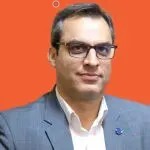
From office machines to technological hardware
Hamid Shojai knows the past years of Kharazmi better than anyone. Hamid Shojaei is the deputy technical support of Kharazmi. He came to Khwarazmi since 1379; When Khwarazmi was not yet named Khwarazmi Information Technology Development Company: "At first, the company's name was Kharazmi Office Machines Company, before that in 1976, the name of this company was Hardane and its names have changed over time. Until today, the full name of that company is Kharazmi Information Technology Development Company and its stock market name is Mofakhr.
Shojaei first came to Kharazmi as a technical force and then in the position of technical expert, certified expert, senior expert and step by step he became the deputy support of Khwarazmi: "During different periods of Khwarazmi's activity and different managers, the goals of the company sometimes changed, but still the first and Our most important customer is Saderat Bank. Ker Business is a support company and naturally we didn't want to be just a service provider to a bank. Serving the rest of the banks has always been our intention."
The support structure is the largest complex in terms of human resources and technical aspects in Kharazmi: "Support is done in three layers. Service desk is actually the entrance of the company, the part where all the requests are recorded in this part. Telephone help is also recorded and referred in this section. 10, 15% of problems are solved at this point. The second part is the technical layer of customers and the third layer is documentation and providing training to bank personnel.
Shojaei considers the main challenge of the technical support deputy to be the lack of up-to-date technology and equipment in banks: "We have more than 200,000 hardware equipment left over from previous years, this makes maintenance difficult. Again, the conditions of private banks are better, but in any case, due to the sanctions, we have a difficult situation in purchasing and updating equipment. Supplying parts has become difficult, and the backwardness of hardware generations in Iran has caused backwardness in software issues. It is the change of the hardware generation that also changes the software. According to Shojaei, support departments of companies can accelerate the process of knowledge deposition in the country like a university: "In my opinion, the experience gathered in support companies over many years has the status of a university and can play a role in the plans and programs of companies. be."
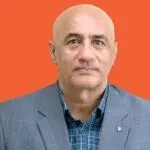
More regulation does not necessarily mean more transparency
Mohammad Ramzanian is the deputy of Kharazmi plan and program, who joined Khwarazmi since Shahrivar 1401; The deputy of the unit whose activity is focused on the implementation of plans approved by the board of directors: "Usually, the board of directors determines the goals, proposes a series of legal frameworks, and the plan and program unit makes it feasible and implements it. In fact, assembly frameworks need a program to be implemented, and the goal without a program is a slogan. How much budget and time the implementation of a project needs is measured by this unit.
Re-engineering of services, re-engineering of financial structure, re-engineering of software systems, increasing job satisfaction of employees, the final business stabilization plan are the projects that are planned and planned in this unit. Ramzanian considers the budget problem to be the most challenging issue in this unit: "Many laws govern the public joint-stock company. In a country where investing in dollars and housing is safer than buying stocks. As a result, we are facing more problems. At the same time, vague laws increase interpretation and cumbersome laws are deterrents.
We serve thousands of bank branches but it is difficult to settle the bills with the banks and the multiplicity of regulatory bodies has challenged us in settling the banks. We have a regulation and a deregulation, regulation and deregulation, I want to say that the more the law governs things, it does not actually mean transparency, but it means the slowing down of businesses. "Works like ours that operate in the field of engineering and technology need to be innovative and open in the scope of their activities."
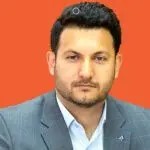
Ehsan Shalamgo is the vice president of Kharazmi engineering services. The focus of this deputy is on data-oriented services and advanced banking services. He believes that cumbersome and complex laws challenge technology and innovation, and due to the high speed of technological progress, he considers the attractiveness and at the same time the challenge of this path to be on the edge of technology. : "Businesses like ours are on the cutting edge of technology. The fact that new technologies enter the market every day is an attractive and challenging issue in itself, but in this field, with the significant increase in the demand for specialists, we are deeply faced with the challenge of human resources, also considering that the appropriate infrastructure has been created for remote work in this field. The work of specialists in this field is also available in foreign companies, and people do not want to work in state-owned companies.
The questioner believes that with the development of the Internet in the country, the volume of data has grown exponentially and issues such as data governance are quite tangible, and this issue increases the importance of engineering departments: "Social networks, the increase of Internet users who use online services, and consequently The increase in Internet searches, exchange of text messages, multimedia files, and Internet of Things are the main reasons for the increase in data volume. In this sector, we are trying to expand our relations with partner companies and activists in this field by providing services based on big data and artificial intelligence, and use the existing experiences and capacities.
Response; Executive and operational arm of Kharazmi company
Another company of Khwarazmi information technology development subsidiary is Kharazmi Hardware Developers Company (Paskh). Hamid Ahmadian, CEO of Answer, is one of the old Khwarazmi: "I joined Khwarazmi in 1977. In 1991, the company purchased land in Saveh Industrial Town, it was put into operation in 1992, and the company started its official activities in 1993. The answer is actually the executive and operational arm of Mofakher company in the field of production and specialized repairs of storage equipment and services and has specialized repair workshops in 9 provinces of the country. "Consulting, designing, manufacturing, assembling, installing, operating, and supporting computer hardware devices and computer equipment are part of the important activities of the response."































